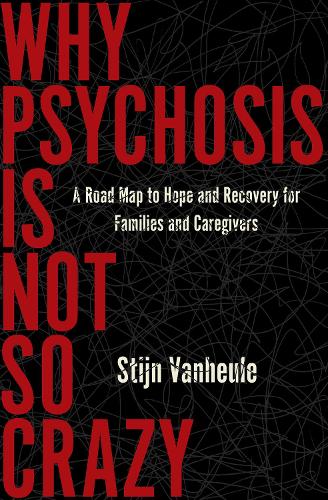
Why Psychosis Is Not So Crazy: A Road Map to Hope and Recovery for Families and Caregivers
(Paperback)
Publishing Details
Why Psychosis Is Not So Crazy: A Road Map to Hope and Recovery for Families and Caregivers
By (Author) Stijn Vanheule
Other Press LLC
Other Press LLC
15th October 2024
17th September 2024
United States
Classifications
General
Non Fiction
616.89
Physical Properties
Paperback
240
Width 133mm, Height 203mm
369g
Description
Are we all a little crazy Roughly 15 percent of the population will have a psychotic experience, in which they lose contact with reality. And yet we still often struggle to understand and talk about psychosis. Interactions between people build on the stories they tell each other-stories about the past, about who they are or what they want. In psychosis we can no longer rely on these stories, this shared language. So how should we communicate with someone experiencing reality in a radically different way than we are Drawing on his work in psychoanalysis, Stijn Vanheule seeks to answer this question, which carries significant implications for mental health as a whole. With a combination of theory from Freud to Lacan, present-day research, and compelling examples from his own patients and well-known figures such as director David Lynch and artist Yayoi Kusama, he explores psychosis in an engaging way that can benefit those suffering from it as well as the people who care for and interact with them. A respected psychoanalyst and professor offers a new, humanizing perspective on psychosis and how we can effectively respond to mental health crises. Are we all a little crazy Roughly 15 percent of the population will have a psychotic experience, in which they lose contact with reality. And yet we still often struggle to understand and talk about psychosis. Interactions between people build on the stories they tell each other-stories about the past, about who they are or what they want. In psychosis we can no longer rely on these stories, this shared language. So how should we communicate with someone experiencing reality in a radically different way than we are Drawing on his work in psychoanalysis, Stijn Vanheule seeks to answer this question, which carries significant implications for mental health as a whole. With a combination of theory from Freud to Lacan, present-day research, and compelling examples from his own patients and well-known figures such as director David Lynch and artist Yayoi Kusama, he explores psychosis in an engaging way that can benefit those suffering from it as well as the people who care for and interact with them.
Reviews
This superb and highly accessible book shows how psychosis should be seen less as an illness than as a way of responding to difficulties and trauma in our early lives. It offers a destigmatizing and profoundly humane approach both to thinking about and working with psychosis, reminding us how so much of what tends to be seen as negative and incorrect behavior is in fact a creative solution that the psychotic subject has developed in order to find safety. Vanheules book will be an invaluable resource for anyone touched by psychosis, whether they are a patient, a family member, or a clinician. Darian Leader, author of Introducing Lacan
Vanheuleis known for his constructive, in-depth research on the DSM and psychosisWith his familiar clear style, he succeeds in [comprehensively explaining psychosis to a wide audience]. Tijdschrift voor Psychiatrie
[Vanheule] dispels the myth that psychosis is best viewed through a purely biological lens. Sociaal.Net
Author Bio
Stijn Vanheule, PhD, is a clinical psychologist, professor at Ghent University, Belgium, and psychoanalyst in private practice (New Lacanian School for Psychoanalysis and World Association of Psychoanalysis). He is the author of the books The Subject of Psychosis- A Lacanian Perspective, Diagnosis and the DSM- A Critical Review, and Psychiatric Diagnosis Revisited- From DSM to Clinical Case Formulation, as well as multiple papers on Lacanian and Freudian psychoanalysis, psychoanalytic research into psychopathology, and clinical diagnosis.
